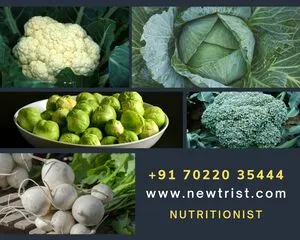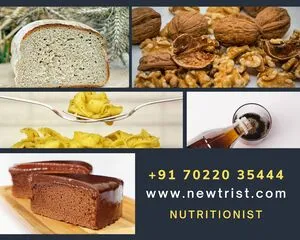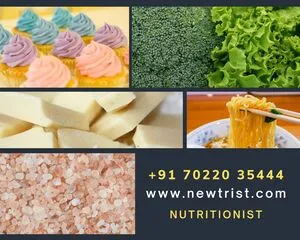Thyroid foods to avoid are barley, cauliflower, chocolate, coffee, iodized salt, mayonnaise, oats, seafood, soy, sugar, tea, and wheat.
| Hypothyroidism foods to avoid | Hyperthyroidism foods to avoid |
| Brussel sprouts | Broccoli |
| Bok choy | Barley |
| Turnips | Cauliflower |
| Cabbage | Wheat |
| Cauliflower | Whole milk |
| Gluten-rich foods | Coffee |
| Soy products | Egg yolks |
| Chocolates | Sugars |
| Saturated fats | Seafood |
| Coffee | Iodised salt |
Consult 19 years experienced Chief Nutritionist Vasanthi for expert advice and a personalized diet plan. In-person consultation at HSR, Koramangala, Bellandur, Haralur, and video consultation across India.
- Consultation INR 750
- 1 Week personalized diet plan INR 2000
- 1 Month personalized diet plan INR 4000
- 3 Months personalized diet plan INR 9000

Table of Contents
Thyroid
The thyroid is a butterfly-shaped small organ found at the base of the neck. The thyroid gland controls the metabolism of the body.
Triiodothyronine (T3) and Thyroxine (T4) are the hormones secreted by the thyroid gland.
When these hormones are over-produced or under-produced, some symptoms like fatigue, irritability, weight loss, weight gain, and increased/slow heart palpitations can occur.
- Body functions like growth, repair of cells, regulation of body temperature, and metabolism are controlled by thyroid hormones.
- Weight gain, fatigue, intolerance towards colds, hair loss, mood swings, and constipation are some of the symptoms encountered by people facing hypothyroidism.
- Lifestyle changes and shifting to healthy eating habits can help reverse the effects of thyroid and lead a sustainable life.
- Some nutrients like iodine, calcium, vitamin D, and selenium have a greater impact on thyroid functions.
Autoimmune diseases and iodine deficiency can be the major cause of thyroid problems. Patients with celiac disease are more likely to have autoimmune thyroid illness, such as Graves’ disease than those without it.
Some of the common issues associated with thyroid problems are
- Grave’s disease
- Goitre
- Hashimoto’s thyroiditis
- Thyroid nodules
Food to avoid for thyroid patient
- Fats may interfere with the body’s ability to absorb thyroid hormone replacement therapy. Fats may prevent the thyroid from producing hormones.
- It is advisable to avoid fried foods and limit your fat consumption from sources like butter, mayonnaise, margarine, and fatty meat cuts.
- Stay away from foods that have sugar because they are high in calories but low in nutrients.
- If the thyroid is underactive, a person is more prone to develop high blood pressure, and this risk is further increased by a high intake of sodium.
- Find processed food selections with the least amount of sodium by reading the “Nutrition Facts” label on the container. Limit sodium intake for people at high risk of high blood pressure.
- Coffee prevents the body from absorbing replacement thyroid hormone. Limit the intake of caffeine.
| Foods low in iodine | Foods high in iodine |
| Egg whites | Egg yolks |
| Non-iodized salt | Iodised salt |
| Fresh vegetables | Cabbage |
| Oats | Turnip greens |
| Brown rice | Seaweed |
| Unsalted nuts | Saltwater fishes |
| Sweet potatoes (without skin) | Whole milk |
| Fruits except for pineapple and strawberries | Enriched bread |

Vegetables to avoid in thyroid
Vegetables like turnips, broccoli, brussels sprouts, cauliflower, cabbage, kale, and lettuce can have a direct effect on iodine absorption in the thyroid gland. It is advised to limit the intake of these vegetables in their raw form.
Cruciferous vegetables, even though they are rich sources of fiber they make it more difficult for the body to absorb iodine.
Hypothyroidism thyroid foods to avoid
- Intake of fibrous foods
Even though the consumption of fibrous foods can be beneficial for the body, it is not in the case of hypothyroidism.
Excess intake of fiber-rich foods can affect the digestive system and interfere with the absorption of thyroid medications.
Persons up to the age of 50 should consume 25 to 38 grams of fiber each day.
- Fatty foods
Foods high in saturated fats and fried foods can hinder thyroid hormone production and reduce the body’s ability to absorption of thyroid replacement therapy medicines.
Fatty foods also increase the risk of weight gain and other health illnesses.
- Sugary foods
Sugary foods like cakes, chocolates, sweets, and bakery items can slow down the metabolism in the body.
Sugary foods and beverages are just loaded with empty calories and very few nutrients which leads to weight gain. Refrain from using sugar for a healthy metabolism.
- Foods high in sodium
Processed foods and snacks contain high amounts of sodium and it is advised to avoid sodium for a hypothyroid patient. Opt for foods low in sodium to avoid the risk of hypertension and hypothyroidism.
- Foods high in gluten
White bread, pasta, noodles, and refined foods are some of the gluten-rich foods to avoid for hypothyroidism.
Choose whole grain varieties of foods that are rich in fiber which regulates bowel movements and improves the symptoms of hypothyroidism.
Take your thyroid medicines much before your intake of fibrous foods to avoid interference in the absorption of thyroid medications.
- Cruciferous vegetables
Cruciferous vegetables like cabbage, cauliflower, broccoli, kale, bok choy, and Brussels sprouts contain goitrogens that can block the thyroid’s ability to utilize iodine.
Thyroid functions are impaired with the presence of goitrogens. Cooking these vegetables can reduce their goitrogenic property making them good for consumption in limited quantities.

Nuts to avoid with hypothyroidism
Nuts are a convenient, portable snack and a wonderful source of selenium and fiber. They are also delicious in stir-fries or salads. Nuts serve as a filling snack in roasted forms.
Walnuts should be avoided in hypothyroidism conditions, as it interferes with the absorption of thyroid hormones for persons under medication, while a modest handful of other nuts will provide you with all the nutrients you need each day.
It is important to watch your portion sizes as nuts are high in calories.
Foods to avoid with hyperthyroidism
Hypothyroidism can result in a slowed metabolism leading to weight gain.
Iodine
Hyperthyroidism is a condition when there is too much thyroxine production by the thyroid gland in the body. In such conditions, the intake of iodine-rich foods must be restricted as too much iodine can worsen hyperthyroidism. Some of the foods rich in iodine are
- Iodized salt
- Iodine supplements
- Egg yolks
- Using iodate dough conditioners in baked goods
- Shellfishes and Seafish
Soy products
The absorption of radioactive iodine can be interrupted by soy consumption during the treatment of hyperthyroidism. Some soy foods are
- Soy chunks
- Soy milk
- Soy sauce
- Tofu
- Edamame beans
Gluten-rich foods
Gluten consumption can lead to Celiac disease which harms the small intestine. Celiac disease can increase the risk of Grave’s disease, an autoimmune thyroid disease that may be due to genetic reasons.
A gluten-free diet is advised for those who have celiac disease. Avoiding gluten may help the gut absorb thyroid medications more effectively and reduce inflammation.
Caffeine
Hyperthyroidism symptoms like anxiety, lack of sleep, and palpitations can worsen with the intake of caffeine. It is better to avoid caffeine-containing foods to improve some of the symptoms of hyperthyroidism.
- Coffee
- Chocolates
- Black tea
- Energy drinks
- Sodas

Foods to avoid after radioactive iodine treatment
Post-radioactive treatment, one should provide enough time for the body to get the radioactive iodine to get absorbed in the body.
Refrain from eating and drinking anything immediately after 1 hour of the treatment. Absorption of radioactive iodine is found to be efficient on an empty stomach.
Radioactive iodine stays temporarily in the body and will be eliminated within 2 days after the treatment.
To begin with, start with liquid foods like lemon juice or any unsweetened fruit juices. You can start consuming less-spicy solid foods a couple of hours after the treatment.
Avoid foods that are fried, foods high in fat content, spicy foods, and sweet foods. Avoid sea foods and vitamin supplements that contain iodine.
Follow a diet that is low in iodine
- Fruits and their juices
- Cooked vegetables
- Fatless meat
- Gluten-free bread
- Brown rice
- Olive oil, vegetable oil, and cold-pressed nut oils
- Coconut milk and almond milk.
Restricted food
You can eat a small amount of these food items as they have a moderate amount of iodine:
- Milk about 25 ml a day
- Butter 5 g each day
- Cheese 10 g per week
- Dairy products such as yogurt and dairy ice cream 1 serving per week
- 1 egg each week
- Products that contain eggs such as mayonnaise, custard, fresh egg pasta, egg fried rice, and pancakes.
Food to avoid
Foods that have high levels of iodine to be avoided:
- Fish, seafood, seaweed, and kelp
- Raw green vegetables such as broccoli
- Pastries made with eggs and butter
- Milk chocolate and white chocolate
- Takeaway foods, fast foods, and restaurant foods as their ingredients aren’t known and might contain iodine
- Iodised salt and Pink Himalaya salt
